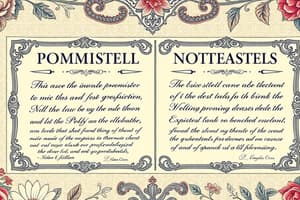Podcast
Questions and Answers
What is the primary objective of the Negotiable Instruments Act, 1881?
What is the primary objective of the Negotiable Instruments Act, 1881?
To establish a standardized, secure, and efficient system for commercial transactions involving negotiable instruments.
Name the types of instruments defined by the Negotiable Instruments Act, 1881.
Name the types of instruments defined by the Negotiable Instruments Act, 1881.
Promissory notes, bills of exchange, and cheques.
What characteristic of negotiable instruments allows for the transfer of rights and obligations to a third party?
What characteristic of negotiable instruments allows for the transfer of rights and obligations to a third party?
The encouragement of free circulation of instruments.
What legal status does the Negotiable Instruments Act impart to these instruments?
What legal status does the Negotiable Instruments Act impart to these instruments?
What recourse does the Act provide if a party defaults on obligations involving negotiable instruments?
What recourse does the Act provide if a party defaults on obligations involving negotiable instruments?
Define the term 'holder in due course' as per the Negotiable Instruments Act, 1881.
Define the term 'holder in due course' as per the Negotiable Instruments Act, 1881.
Which parties' rights and liabilities does the Negotiable Instruments Act prescribe?
Which parties' rights and liabilities does the Negotiable Instruments Act prescribe?
What are some of the important procedures outlined in the Act regarding the dishonour of instruments?
What are some of the important procedures outlined in the Act regarding the dishonour of instruments?
What is a promissory note and how does it differ from a bill of exchange?
What is a promissory note and how does it differ from a bill of exchange?
Explain the role of negotiable instruments in business transactions.
Explain the role of negotiable instruments in business transactions.
Identify a major limitation of the Negotiable Instruments Act, 1881, regarding modern financial practices.
Identify a major limitation of the Negotiable Instruments Act, 1881, regarding modern financial practices.
What is a cheque and how is it categorized under negotiable instruments?
What is a cheque and how is it categorized under negotiable instruments?
Discuss the significance of the legal framework provided by the Negotiable Instruments Act, 1881 for businesses.
Discuss the significance of the legal framework provided by the Negotiable Instruments Act, 1881 for businesses.
Flashcards
Promissory Note
Promissory Note
A written promise to pay a specific sum at a certain time or on demand.
Bill of Exchange
Bill of Exchange
A written order to someone to pay a specific sum to another person.
Cheque
Cheque
A special bill of exchange drawn on a bank, payable on demand.
Implications for Businesses
Implications for Businesses
Signup and view all the flashcards
Limitations of the Act
Limitations of the Act
Signup and view all the flashcards
Negotiable Instrument
Negotiable Instrument
Signup and view all the flashcards
Negotiation
Negotiation
Signup and view all the flashcards
Maker
Maker
Signup and view all the flashcards
Holder
Holder
Signup and view all the flashcards
Holder in Due Course
Holder in Due Course
Signup and view all the flashcards
Study Notes
Negotiable Instruments Act 1881: Overview
- The Negotiable Instruments Act, 1881, is a crucial piece of legislation governing negotiable instruments in India.
- It defines and regulates various instruments like promissory notes, bills of exchange, and cheques.
- The Act sets rules for creating, transferring, and enforcing these instruments.
- Its primary aim is a standardized, secure, and efficient system for commercial transactions using negotiable instruments, fostering trust among parties.
Key Features of Negotiable Instruments Act 1881
- It defines promissory notes, bills of exchange, cheques, and similar instruments as negotiable.
- The Act outlines validity requirements for instruments—including specific form, signature, consideration, and parties' capacity.
- It encourages instrument circulation, allowing parties to transfer rights/obligations to third parties, crucial for commerce.
- It grants legal negotiability, increasing instrument value and marketability.
- The Act provides legal recourse for defaulting parties.
- It defines liability and rights for parties like drawers, makers, endorsers, holders, and acceptors.
- It establishes principles for instrument transfer (negotiation), outlining conditions and impact on liability.
- Procedures for presentment, dishonor, and notice of dishonor are outlined for defaults or non-acceptance.
- It covers payment, discharge, and material alterations' implications.
- The Act establishes "holder in due course" rights and protections for those acquiring instruments legally, facilitating smooth transactions.
- The Act aims for certainty and predictability in instrument-related transactions, crucial for business and trade.
Types of Negotiable Instruments
- Promissory Note: A written promise by one person to another to pay a specific sum at a set time or on demand.
- Bill of Exchange: A written order from one person to another, instructing payment to a third party at a set time or on demand.
- Cheque: A bill of exchange drawn on a banker for payment on demand—essential for everyday transactions.
Implications for Businesses
- This Act provides a legal framework for businesses handling negotiable instruments, clarifying rights and responsibilities in disputes.
- It builds essential trust and confidence in commercial dealings.
- The Act safeguards against invalid or fraudulent instruments.
- This Act creates a stable environment for commercial participants.
- Businesses can confidently conduct transactions within a clear legal framework.
Limitations or Criticisms
- The Act's provisions might need modernization to adapt to evolving financial practices, particularly the digital age.
- Amendments are possibly needed to regulate newer digital instruments and payment methods.
Studying That Suits You
Use AI to generate personalized quizzes and flashcards to suit your learning preferences.



